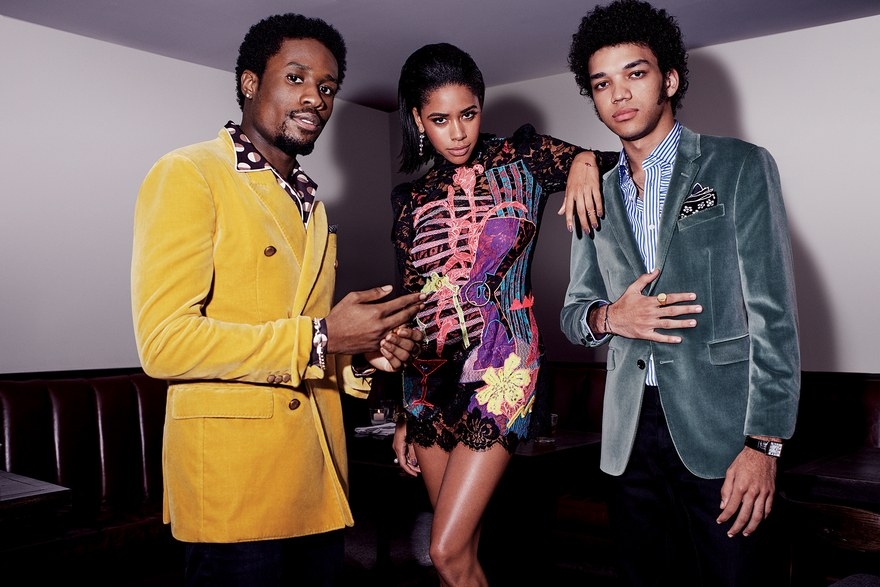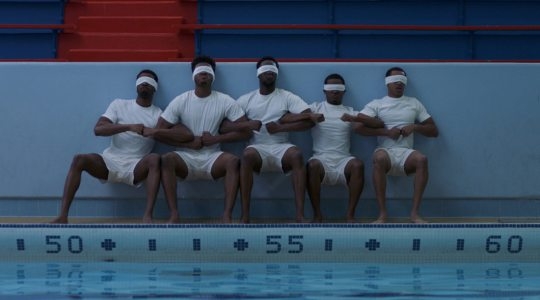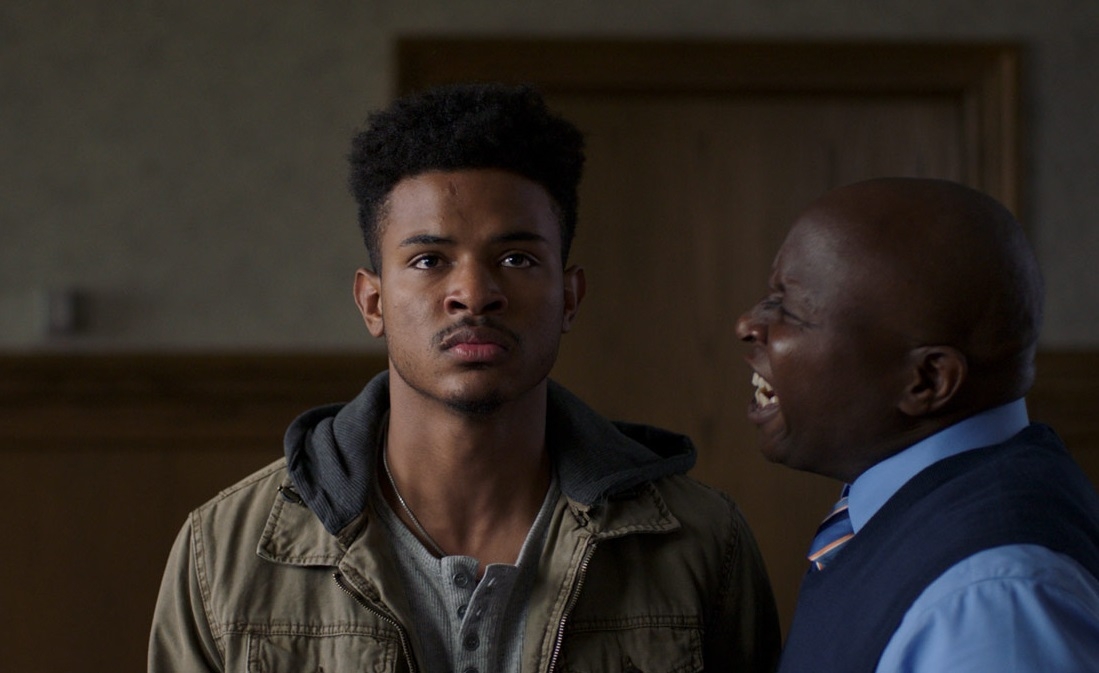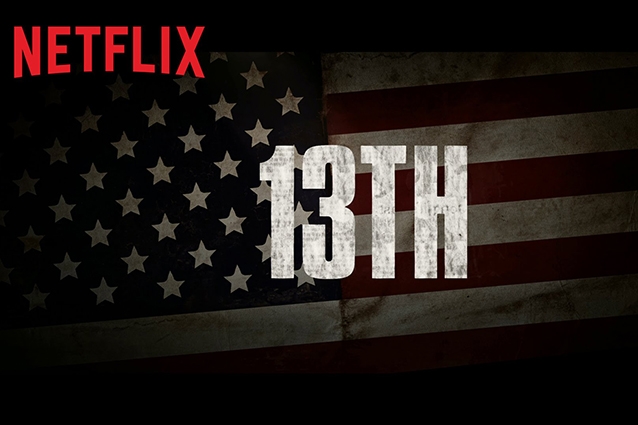The second part of Baz Luhrmann’s 70’s set musical drama, “The Get Down” is finally hitting Netflix on Friday, April 7th. The lush and vibrant series follows Bronx native Ezekiel “Zeke” Figueroa (Justice Smith) and his group, The Get Down Brothers on their quest to hip-hop superstardom. Zeke’s girlfriend, Mylene Cruz (Herizen Guardiola) is also desperate to make it big in disco and escape her oppressive religious upbringing. Also along for the ride is Shaolin Fantastic (Shameik Moore) an aspiring DJ who is trying to keep his side hustle going at the same time
The first part of season one of “The Get Down” set the scene for the birth of hip-hop as it evolved from funk and disco. The second part of “The Get Down” will jump a year ahead to 1978 where Mylene and The Get Down Brothers are making a name for themselves on the music scene.
Ahead of the premiere of Part 2, I sat down with Justice Smith, Herizen Guardiola and Shameik Moore to discuss what they’ve learned so far about the birth of hip-hop, where their characters are headed, and how the music of the ’70s has influenced them today.
Aramide Tinubu: “The Get Down” is such a wonderful concept that really encompasses and embodies a specific generation. What does it mean to you when people approach you and say, “Oh my God, you captured that time and that generation so well”?
Herizen Guardiola: I didn’t have the biggest idea about the ‘70s or even about hip-hop until the show. We got to work with the hip-hop OGs of the ‘70s, so the fact that we captured it and it’s authentic according to people who were actually there, I’m happy. That’s what we wanted to do, and I think we did it pretty well, so I’m really happy about that.
Justice Smith: It speaks to what we managed to create together. Baz [Luhrmann] supplied us with all of these resources and all of these, movies and music and books and all of this stuff. He wanted us to really immerse ourselves in that time period and in that culture so that we weren’t putting something on screen that was disingenuous. So, when someone comes up to us on the street who is actually from that place and time period and says, “You guys did it justice,” it’s a huge moment, and it extends to the entire family because it was all of us coming together to make it as authentic as possible.
AT: How have things been for you guys since the success of the show?
JS: It’s been amazing. I’m just so grateful to be a part of something that so many people connect to, and it’s really revolutionary in a way to bridge that age gap by telling a story that hasn’t been told before about the origins of hip-hop, and about the South Bronx. Even young kids are coming up to us and saying how inspired they are. I have aspiring rappers and poets coming up to me and being like, “I’m half- Black and half –Puerto Rican as well, I’m from the Bronx as well, you inspired me to write more.” That kind of stuff really touches my heart.
HG: I have people ask me, and I answer honestly, they say, “I’m really good at singing, or I’m really good at this art form, and I really think I have a chance, should I give up school and do it?” I’m like Jesus Christ. [Laughing] I answer honestly because I kind of did that. I could have gone the school route, but I was like, “Nah, I’m good at this thing I love to do, and I think I can make a career out of it.” So, I always say the most cliché thing, I say, “If you think you have a chance you should follow your dreams, you’re not going to be happy doing anything else, so what’s the point?” It’s your life; you need to be happy in your life.
AT: Through your relationship with Baz, you have gotten a sort of education in media, and new opportunities are presenting themselves for you.
HG: Yeah! For me, coming on to the show, I’ve opened up a whole new chamber of myself, and I’ve just let it expand, and I’ve grown. I’ve even gotten in touch with my Latina heritage more. So for me, it’s been an eye-opener and a learning experience. I’ve really become a different person through this but in the best way.
AT: The way that this series was shot is so interesting to me, shooting one chunk of the first season and then another, what did you all learn about yourselves and your characters by going through this particular filming process?
HG: (Laughing) I learned that I have a lot more patience than I thought I did, and I have a whole new side of understanding that it’s not just you that is a part of something. I’m working in a collective consciousness to reach and get a story out. I really became a team player. So, you learn that give and take flow, and I learned that even more on the show because we really had to be a support system for each other. I came straight out of high school, moved to New York at eighteen, not knowing anybody or anything. So, these boys and my girls and Baz and the Netflix team, they’ve been my support system, and we have become a family. I’ve learned about myself.
AT: The music is obviously an extremely important aspect of the series. However, there were some whisperings that it needed more hip-hop even though, we all know that without disco and funk there would be no hip-hop. Could you explain what your emotions and state of mind were going back and listening to some of that old music especially if you hadn’t heard it before?
JS: There are certain hip-hop artists from that time period that I feel ashamed that I didn’t know before. When people my age ask, “Who is this?” I’m like, “Grandmaster Flash and the Furious Five, how could you not know that?!” Or Afrika Bambaataa or Houdini, all of them. My parents are both musicians; my dad is a funk musician, so I grew up listening to Earth, Wind & Fire and things like that. So, that was not new to me, and I had heard “The Message” from Grandmaster Flash, so that was the extent of my knowledge of that time period. Then delving in deeper, I realized how expansive this world was, and how there are songs that I’ve heard on the radio that are literally an extraction of a beat from ‘The Message.” There are also lines or couplets from songs from the ‘70s that the people of our generation don’t really even realize influences our music today. It was really interesting to see and to make that connection.
Continue reading at Shadow and Act.



 If you exist outside of the Greek world, and certainly if you attended a predominantly white university as a student of color, Greek life swirls around you.
If you exist outside of the Greek world, and certainly if you attended a predominantly white university as a student of color, Greek life swirls around you. Fraternities and sororities at historically Black colleges and universes have had a significant impact not just on the students who are a part of them but on the Black community as a whole. In films like “Drumline” and “Stomp the Yard,” which are set on HBCU campuses, we often get a small glimpse into the sacred world of pledging, the focus of these film shining a light on other aspects of college life. Perhaps not since Spike Lee’s 1988 film “School Daze” has there been such a major focus on pledging Black frats and sororities and the hazing that often comes along with that.
Fraternities and sororities at historically Black colleges and universes have had a significant impact not just on the students who are a part of them but on the Black community as a whole. In films like “Drumline” and “Stomp the Yard,” which are set on HBCU campuses, we often get a small glimpse into the sacred world of pledging, the focus of these film shining a light on other aspects of college life. Perhaps not since Spike Lee’s 1988 film “School Daze” has there been such a major focus on pledging Black frats and sororities and the hazing that often comes along with that. Growing up, prison seemed like an abstract concept to me, one reserved for “Law & Order” episodes and select family members who would be absent every other Christmas or Thanksgiving holiday. It wasn’t until I arrived in college in a class on Black Urban Studies, that I was educated about the mass incarceration that occurs in this country. I watched the 1998 documentary “The Farm: Angola, USA,” and read Michelle Alexander’s “The New Jim Crow: Mass Incarceration in the Age of Colorblindness.” It was through these two mediums that the system of dehumanization and oppression was revealed to me. I distinctly remember feeling horrified that the prisoners of Angola were required to pick cotton as a part of their daily tasks. Slavery was, after all, long ago abolished. However, I soon learned and continued to learn that nothing ever really goes away; it’s merely reinvented into a more easily digestible package ripe for public consumption.
Growing up, prison seemed like an abstract concept to me, one reserved for “Law & Order” episodes and select family members who would be absent every other Christmas or Thanksgiving holiday. It wasn’t until I arrived in college in a class on Black Urban Studies, that I was educated about the mass incarceration that occurs in this country. I watched the 1998 documentary “The Farm: Angola, USA,” and read Michelle Alexander’s “The New Jim Crow: Mass Incarceration in the Age of Colorblindness.” It was through these two mediums that the system of dehumanization and oppression was revealed to me. I distinctly remember feeling horrified that the prisoners of Angola were required to pick cotton as a part of their daily tasks. Slavery was, after all, long ago abolished. However, I soon learned and continued to learn that nothing ever really goes away; it’s merely reinvented into a more easily digestible package ripe for public consumption.